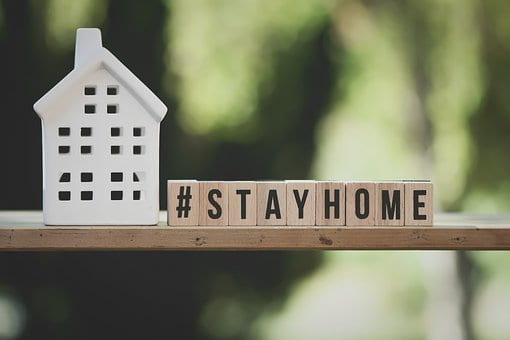The COVID-19 pandemic is forcing us all to re-imagine our personal and professional lives. This post is for anyone who finds this call to “be imaginative” an added stress in an uncertain time.
Calls For Imagination
Anyone familiar with imaginED will know that I’m a huge advocate for imagination. I believe it is one of humankind’s greatest capacities and lies at the heart of all learning. I believe that nurturing imagination in all of our students should be one of our central aims as educators. Sometimes I’ve found it hard to round up support for imagination in a world that is skeptical about its value for “real work” and “serious learning”. When the COVID-19 pandemic hit things seemed to change. Imagination started to be identified for its potential and calls for imagination could be heard in multiple domains (e.g. We Need Imagination Now, More Than Ever or Want to beat COVID? Start With Using Your Imagination).
On one hand, I am pleased to see imagination getting some long-overdue credit. On the other, I fear this call to “be imaginative” may result in people feeling additional stress and adopting unachievable expectations of others. Some of that stress about “being imaginative” is fueled by uncertainty about what imagination is—it’s clear that we do not all use the word to mean the same things.
I want to point to the ways in which imagination constantly works in our daily lives and is already helping everyday people survive this plague. I also want to share why, if you are experiencing undue stress, now may not be a time you can fully unleash your imagination. It’s easy to judge ourselves harshly—categorizing our daily practices as unimaginative and being overly critical if we are less productive than usual or can’t come up with new, ground-breaking ideas. I want to address misunderstandings of imagination that may be causing people unnecessary self-critique right now.
Your Daily Acts of Imagination
In 2019, I did a small study that looked at features of Imaginative Workplaces*. I surveyed an environmental scientist, a music teacher, a computer science student, a doctoral candidate, an elementary teacher, a high school teacher, an animator and an interior designer. I first asked my study participants what “imagination” meant to them.
They said imagination
- is exploration
- is thinking through possibilities
- brings creativity
- is an idea
- is problem-solving
- is engaged through playing, reading, writing, creating
- is envisioning the possible
- is dreaming
- is creating, producing, designing
- “is the ability to view the world as it might be, not as it is”
Their ideas about imagination reveal its human dimensions. Imagination is not only the work of the greatest minds—it is the work of all minds as we problem-solve or make, play, or write. Kieran Egan’s Imaginative Education philosophy reveals how a central vehicle of the imagination is the story-form and how cognitive tools represent the many ways in which we are engaged by stories in our lives and through which we, as story-telling animals, create our own.
 As you figure out your new story in this time—as you make emotional sense of your new reality—you are engaging your imagination in that storytelling process. As you figure out new ways to work or play or relax or celebrate in your life, you are engaging the imagination: the ability to surpass the actual and conceive of what is possible. I’ve seen lots of imagination at work in my community, in my kitchen, on the internet: Sidewalk art. New recipes. Bread-baking. A guy playing UNO with a chicken. An art gallery for a gerbil. Teachers reading stories aloud for their students. When we understand how imagination is much more central to our activities as humans, we can ease some of the pressure off ourselves. We may acknowledge that, yes, we are imaginative and, yes, day-by-day we are re-imagining our situations.
As you figure out your new story in this time—as you make emotional sense of your new reality—you are engaging your imagination in that storytelling process. As you figure out new ways to work or play or relax or celebrate in your life, you are engaging the imagination: the ability to surpass the actual and conceive of what is possible. I’ve seen lots of imagination at work in my community, in my kitchen, on the internet: Sidewalk art. New recipes. Bread-baking. A guy playing UNO with a chicken. An art gallery for a gerbil. Teachers reading stories aloud for their students. When we understand how imagination is much more central to our activities as humans, we can ease some of the pressure off ourselves. We may acknowledge that, yes, we are imaginative and, yes, day-by-day we are re-imagining our situations.
Why It Can Be Hard To Be Imaginative
Back to my 2019 study… I wanted to better understand what enables and disables “imagination” in a variety of contexts. The people I surveyed said that imagination is disabled in the workplace when we are:
- stressed
- overloaded
- lacking in time
- lacking in resources
- uncomfortable (e.g. feeling unsupported or “alone” in our ideas)
- exhausted (physically/mentally)
- surrounded by low morale
- restricted by too many rules
Many of you will be working from home right now. Your home is your workplace. I would be willing to bet that some of you are experiencing some of the factors on this list. Have you been asked to re-imagine your role at work? Have you asked others to re-imagine theirs? No easy task. All learning is embodied—tied to our emotions, physical and psychological needs. Right now, in uncertain times when we may be experiencing physical and emotional distress, it can be challenging to fully re-imagine who we are and what we do. As author Robert Macfarlane notes in this post, the imagination doesn’t thrive when our basic physiological, safety, and belonging needs are not met. So if you are feeling overwhelmed, don’t expect to be able to fully unleash your imagination.
If our workplaces are causing us stress—if we lack time, resources, or support—the same may be true for our students. While some of our students have ample resources, love, and support to weather this storm, many do not. Even if our students have basic resources to learn online, they may be facing anxiety or other mental health challenges brought about
by the current situation, likely exacerbated by separation from friends and family. In light of the message to “stay at home,” I worry for the children who face unsafe home environments. I’m not alone in my concern about how this pandemic may negatively impact children around the world or how it will increase educational inequities unless we can find a way to support all children’s education.
So, if you are finding it hard to function—let alone fully unleash your imagination—know that you are not alone. I’m right there with you. Over the past few weeks I’ve experienced a range of “inspiration”—from none (pure and simple writer’s block) to moments of progress (a week ago I managed to write a solid two pages that, upon revision, I did not completely revise).
Good News
The good news is that imagination is always at work, in at least small ways in our lives. More good news: imagination is resilient, ready to be unleashed when the time is right. MacFarlane suggests, “imagination is squeezed out in the first instance by not having to worry about bureaucracy, and food, shelter, warmth, and the other basics”. And good news: If we can get to a place where we are comfortably bored (e.g. our basic needs are met), then we might actually create space for more imagination and creativity. Yes, boredom can spark creativity. As we continue with social distancing and home-based lives, we can enjoy more family time, bluer-skies, a slower-pace to life, a chance to dedicate time to hobbies. I hope you, too, find that “silver-lining” in these otherwise unsettling times.
I have no doubt that imagination will get us through this plague—from the “big fix” of finding a vaccine to the daily pleasures of developing a new skill or hobby. My hope is that more people can acknowledge how the imagination is at work in their daily re-inventions: in stories and humour, baking breads and reorganizing the kitchen, in relationships, play, and work. Remember that imagination is not only reflected in the greatest inventions or scientific discoveries—it is enacted in the stories you share with your families, in the humour you find in difficult times, in the noticing of patterns on the sidewalk, and in the games you enjoy. Imagination is frequently at work in small and big ways that bring vibrancy and diversity to our lives.
Action
- Be kind to yourself if you are feeling exhausted at the prospect of coming up with innovative or unusual ideas for the moment.
- Be kind to your students (or employees or colleagues) if their work is not what you had hoped for—many people are struggling to meet their basic needs.
- Appreciate when an imaginative idea strikes you!
- Take care of your body—take care of your heart—and try to enjoy your own explorations of the possible.
- Stay home.
*I’d like to thank Wenke Wang for her help as the Research Assistant in this study.





Thanks Gillian Judson for demonstrating that imagination it always waiting for us to stir it up.
In challenging times whether stressed or bored or other imagination can have a healing power.
Time, silence and distance can fuel creative solutions and show us new ways. Let’s try.